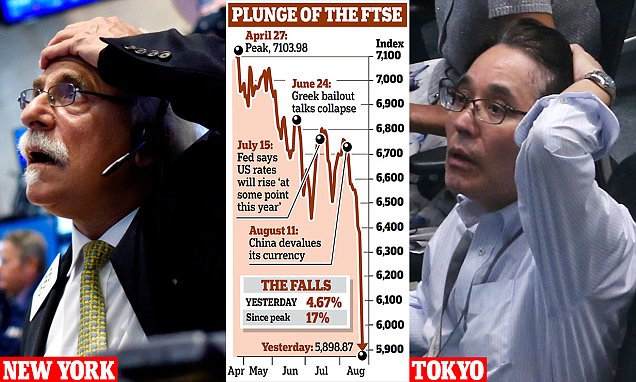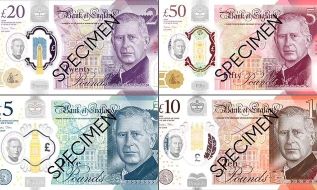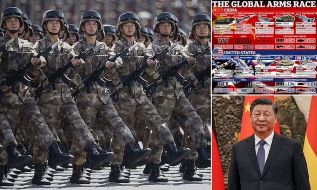Pasar Saham Shanghai dan Tokyo Kembali Terjungkal Akibat `Keruntuhan China`
Great Fall of China: Shanghai and Tokyo Markets Plummet for a Second Day
Editor : Ismail Gani
Translator : Novita Cahyadi

KEPANIKAN melanda perekonomian dunia akibat pelambatan ekonomi
China yang berdampak hebat pada pasar keuangan global, terjadi akibat
pasar saham China anjlok 8,5% hanya dalam sehari. Pagi ini, saham
Shanghai anjlok 6,41% pada awal perdagangan.
Dana hampir 75
miliar poundsterling dari perusahaan-perusahaan terkemuka di Inggris
menguap kemarin, yang disebut sebagai hari terburuk bagi pasar saham
London sejak Maret 2009 - ancaman menuju Resesi Besar.
Aksi
melepas saham - terjadi di seluruh pasar saham Asia, Eropa, dan Amerika
Serikat - terjadi setelah pasar saham China anjlok 8,5% dan disebut
sebagai 'Kejatuhan Terbesar China'. Para analis keuangan
menggambarkannya sebagai 'hari kepanikan terbesar' di pasar global.
Pagi ini, saham Shanghai kembali anjlok 6,41% pada awal perdagangan, sementara saham Tokyo juga turun 4,13%.
Indeks
Komposit Shanghai melorot 3,004.13 poin di menit pertama perdagangan,
terkoreksi 4,33% pada saat break. Indeks Komposit Shenzhen saham juga
merosot lebih dari 6% pada awal perdagangan.
Senin malam, Kanselir George Osborne memperingatkan bahwa Inggris 'tidak kebal' terhadap krisis, seperti dilansir MailOnline.
Dan
mantan Menteri Keuangan AS, Larry Summers pada Senin malam
memperingatkan ancaman terhadap ekonomi global, katanya hal itu 'dapat
menjadi tahap awal dari situasi yang sangat serius' - seperti pada 2008
ketika sistem perbankan dunia di ambang keruntuhan.
Dia meyakini
semalam bahwa lebih dari satu triliun dolar AS menguap dari nilai saham
di seluruh dunia dan dinyatakan sebagai 'Black Monday'.
Ada
spekulasi bahwa kerapuhan dari ekonomi dunia dapat menunda langkah Bank
of England untuk menaikkan suku bunga dalam beberapa bulan mendatang.
Osborne
memperingatkan 'sifat terbuka Inggris' yang saat ini menikmati
investasi miliaran poundsterling dari China, menyiratkan langkah
pemulihan ekonomi masuk kategori bahaya.
Dan dia mengatakan
kondisi turbulen menegaskan kebutuhan untuk memulihkan kondisi finansial
Inggris. "Semua orang prihatin terhadap pasar keuangan Asia," kata
Osborne saat berkunjung ke Helsinki.
Kekhawatiran terhadap
pelambatan ekonomi dan kondisi pasar saham China telah dikhawatirkan
sejak berbulan-bulan lalu. Pemerintah komunis yang campur tangan dalam
beberapa hari terakhir untuk mengatasi kondisi perekonomian dengan
mendevaluasi mata uangnya.
Namun kemarin dampak devaluasi
sangatlah mengejutkan. Indeks FTSE 100 jatuh hingga 6,6% sebelum ditutup
288,78 poin atau 4,67% di 5.898,87 kemarin.
Akibatnya 73,9
miliar poundsterling menguap dari nilai saham perusahaan blue-chip di
Inggris seperti Vodafone dan British Petroleum hingga Rolls-Royce dan
Marks & Spencer.
FTSE yang dijuluki The Footsie kini berada
di tingkat terendah sejak akhir 2012 setelah kehilangan 214,2 miliar
poundsterling dari total saham hanya dalam 10 hari - aksi jual
terpanjang dalam sejarah merosotnya nilai saham selama 11 hari pada
Januari 2003. Hal ini mengakibatkan 17% dari nilai saham atau 308,3
miliar poundsterling sejak menghantam semua saham bernilai tinggi di
atas 7100 hanya empat bulan yang lalu.
Ini adalah bencana bagi
sebagian besar pekerja yang tergantung pada dana pensiunnya. Dana
pensiun mereka yang diinvestasikan di pasar saham melalui terkait dengan
Footsie.
David Madden, seorang analis pasar di perusahaan
perdagangan City IG, mengatakan: 'Kepanikan yang dimulai di Cina sangat
menular. Pasar saham Eropa telah hancur oleh rasa takut bahwa China akan
runtuh. Lautan merah di layar perdagangan mengingatkan krisis kredit.
Dealer tidak tahu apa yang harus dilakukan karena pasar bergerak sangat
besar dan tidak menentu. "
Kekacauan di London bergema di Eropa
di mana Dax anjlok 4,7 persen di Frankfurt dan Cac turun 5,4 persen di
Paris. Di Wall Street, Dow Jones Industrial Average anjlok lebih dari
1.000 poin pada awal perdagangan sebelum memicu beberapa kerugian.
Jeremy
Cook, kepala ekonom di perusahaan mata uang World First,
menggambarkannya sebagai 'hari panik besar' di pasar global akibat
kekalahan di Cina mengirimkan gelombang kejutan di seluruh dunia.
Mike
McCudden, seorang analis di broker saham Interaktif Investor,
mengatakan: 'Dampak The Great Fall of China akan diingat sebagai mimpi
buruk dari investor di seluruh dunia. Kami telah menyaksikan pembantaian
ketika indeks ekuitas di seluruh dunia jatuh seperti kartu domino.'
David
Buik, analis pasar di broker saham Panmure Gordon, mengatakan: 'Kondisi
akan tetap sangat fluktuatif sampai Natal. Ini adalah berita putus asa
bagi nasabah bank dan pemilik dana pensiun."
Pasar khawatir pada
penurunan tajam dalam perekonomian Cina serta prospek suku bunga yang
lebih tinggi di AS dan Inggris dan krisis di Yunani.
Cina adalah ekonomi terbesar kedua di dunia - dan pasar ekspor terbesar keenam di Inggris.
PANIC OVER over China's slowing economy tore through global
financial markets. Came after the Chinese stock market plunged 8.5 per
cent in a single day. This morning, Shanghai stocks tumbled 6.41 per
cent in early trading.
Markets have plummeted in Asian markets
for a second day as China's slowing economy continues to tear through
financial markets around the world.
Nearly £75billion was wiped
off the value of Britain’s leading companies yesterday, on what was the
worst day for the London stock market since March 2009 – in the depths
of the Great Recession.
The sell-off – which was mirrored across
Asia, Europe and the United States – came after the Chinese stock
market plunged 8.5 per cent on what was named as ‘The Great Fall Of
China’. Analysts described ‘a day of massive panic’ on global markets.
This morning, Shanghai stocks tumbled a further 6.41 per cent in early trading, while Tokyo shares also fell 4.13 per cent.
The
Shanghai Composite Index fell to 3,004.13 in the first minutes of
trading, but were down 4.33 percent by the break. The smaller Shenzhen
Composite Index also slumped more than 6 percent in early trading.
Elsewhere,
other Asian markets were rebounding with Japan's Nikkei reversing early
losses and rising 0.5 per cent to 18,620.89. Hong Kong's Hang Seng
added 1.1 per cent while South Korean and Australian stocks also gained.
Last
night, Chancellor George Osborne warned that Britain was ‘not immune’
from the crisis, which he described as a ‘cause for real concern’.
And
former US Treasury Secretary Larry Summers last night sounded the alarm
about the threat to the global economy, saying it ‘could be in the
early stages of a very serious situation’ – as it was in 2008 when the
banking system stood on the brink of collapse.
It was believed
last night that more than one trillion US dollars (£634billion) had been
wiped from the value of shares worldwide on what other commentators
described yesterday as ‘Black Monday’.
There was speculation that
the fragile nature of the world economy could delay any move by the
Bank of England to raise interest rates in the coming months.
Mr
Osborne warned the ‘open’ nature of Britain’s economy, which now enjoys
billions of pounds of investment from China, meant the recovery could be
put in jeopardy.
And he said the turbulent conditions underlined
the need for restoring order to Britain’s battered public finances.
‘Everyone’s concerned about the situation in Asian financial markets,’
Mr Osborne said during a visit to Helsinki.
Concern about
China’s slowing economy and over-inflated stock market has been growing
for months. Its communist government has intervened in recent days to
try to take the heat out of the situation by devaluing its currency.
But
yesterday the bubble appeared to burst. The FTSE 100 index tumbled as
much as 6.6 per cent before closing down 288.78 points or 4.67 per cent
at 5898.87 yesterday.
The slump wiped £73.9billion off the value
of blue chip companies as household names from Vodafone and BP to
Rolls-Royce and Marks & Spencer saw their share prices slashed.
The
Footsie is now at its lowest level since the end of 2012 having lost
£214.2billion of value in just ten days – the second longest sell-off in
history following an 11-day slump in January 2003. It has lost 17 per
cent of its value or £308.3billion since hitting an all-time high above
7100 just four months ago.
It is a disaster for the vast majority
of workers with pensions. Their nest eggs are exposed to the stock
market through funds linked to the Footsie.
David Madden, a
market analyst at City trading firm IG, said: ‘The panic that started in
China is highly contagious. European stock markets have been crushed by
the fear that China is about to crumble. The sea of red on trading
screens is reminiscent of the credit crisis. Dealers don’t know what to
do with themselves because the market moves are so enormous and
erratic.’
The mayhem in London was echoed in Europe where the Dax
tumbled 4.7 per cent in Frankfurt and the Cac was down 5.4 per cent in
Paris. On Wall Street, the Dow Jones Industrial Average tumbled more
than 1,000 points in early trading before clawing back some of the
losses.
Jeremy Cook, chief economist at currency firm World
First, described it as ‘a day of massive panic’ on global markets as the
rout in China sent shockwaves around the world.
Mike McCudden,
an analyst at stock broker Interactive Investor, said: ‘The impact of
The Great Fall of China will be remembered in the nightmares of
investors the world over. We have witnessed carnage as equity indices
the world over fell like dominoes.’
David Buik, a markets analyst
at stock broker Panmure Gordon, said: ‘Conditions will remain very
volatile up until Christmas. This is such dispiriting news for savers
and pensioners.’
Markets have been spooked by a sharp slowdown in
the Chinese economy as well as the prospect of higher interest rates in
the US and the UK and the crisis in Greece.
China is the world’s second largest economy – and Britain’s sixth biggest export market.















